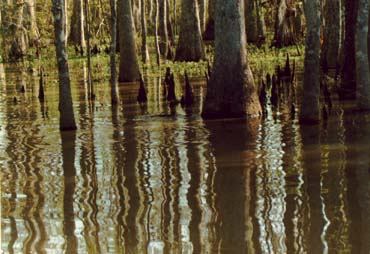
Travel Feature - Bayou Tours
| Discount Travel |
| Travel Bookstore |
| General Services |
| Guides & News |
| Maps |
| Currency Converter |
| Destinations: |
| Amsterdam |
| Travel Suggestions |
| Adventure Travel |
| Travel Magazines |
| StudentNow |

Buy Weekend Getaways in Louisiana
|
Bayou
Tours:
A Guide to the Louisiana Outdoors
Photo ©1999 Juxtapose Media Often referred to as a Sportsman's Paradise, Louisiana is a state for those who truly love the outdoors. Every year, thousands of tourists are drawn to the state by such nature-inspired exhibits as Mud Painting (don't laugh, mud prints have been known to sell for $70 or more), Cajun festivals (the most recent having been Mardi Gras, which introduces tourists to New Orleans' version of "wild life") and, of course, the Louisiana Swamp Tours of the Atchafalaya Basin. The major natural attractions of Louisiana are its beautiful bayou and swamp regions. Although there are smaller wetland areas scattered throughout the northern parts of the state, the cypress-inhabited Atchafalaya Basin lies primarily in the southern region. It is the largest hardwood forest river-swamp in North America. A bayou or a swamp? The word bayou originated from the term bayuk, the Louisiana French word for "small stream" By definition, a bayou is a watercourse, usually the offshoot of a river or lake in a lowland area. It is a sluggish or stagnant creek, frequently flowing through swamp terrain. The term is used mainly when referring to areas in the delta region (the area near the mouth) of the Mississippi River. In comparison, a swamp is low-lying, marshy wetland, and is usually forested and seasonally flooded. While tours of the bayou areas are also offered throughout Louisiana, the Atchafalaya Basin categorizes its expeditions as swamp tours. What types of wildlife can be seen on the Swamp Tours? Alligators are a primary attraction on many of the tours. Some swamp guides will actually feed the alligators so that tourists can get a closer look at the creatures. Egrets, raccoons and nutria rats are also commonly sighted on the tours. Crawfish (crayfish, crawdads, mudbugs) are a common ingredient in most Cajun dishes and can be found in great abundance in the Atchafalaya Basin. Farmers will often flood a portion of their land and set wire traps in time for the crawfish season. Shrimp may also take refuge in these man-made abysses, only to be caught and used as an additional food source. Crabs are also abundant in the briny marshes of southern Louisiana.
|
|
| |
|
StudentNow Home | Features | Shopping | Travel | Jobs | Research | Fun | Life | Sports | Colleges

